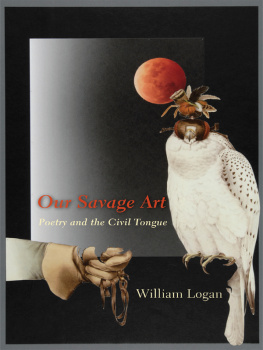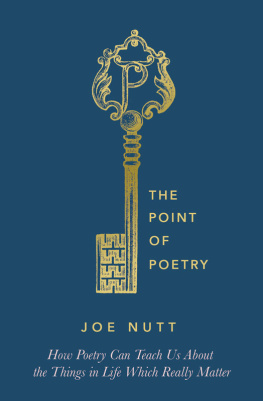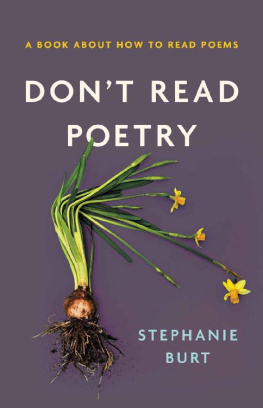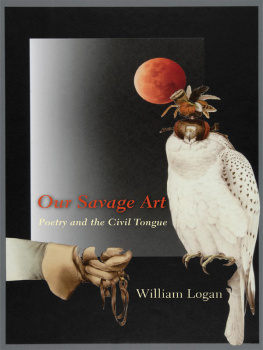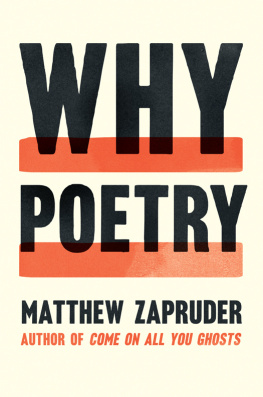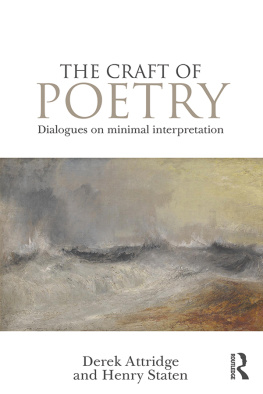GUILTY KNOWLEDGE, GUILTY PLEASURE
Also by William Logan
POETRY
Sad-faced Men (1982)
Difficulty (1985)
Sullen Weedy Lakes (1988)
Vain Empires (1998)
Night Battle (1999)
Macbeth in Venice (2003)
The Whispering Gallery (2005)
Strange Flesh (2008)
Deception Island: Selected Early Poems (2011)
Madame X (2012)
CRITICISM
All the Rage (1998)
Reputations of the Tongue (1999)
Desperate Measures (2002)
The Undiscovered Country (2005)
Our Savage Art (2009)
EDITIONS
Randall Jarrell, Poetry and the Age, expanded edition (2001)
John Townsend Trowbridge, Guy Vernon (2012)
Guilty Knowledge, Guilty Pleasure
THE DIRTY ART OF POETRY
WILLIAM LOGAN
COLUMBIA UNIVERSITY PRESS
New York

COLUMBIA UNIVERSITY PRESS
Publishers Since 1893
NEW YORK CHICHESTER, WEST SUSSEX
cup.columbia.edu
Copyright 2014 William Logan
All rights reserved
Library of Congress Cataloging-in-Publication Data
Logan, William, 1950
Guilty knowledge, guilty pleasure : the dirty art of poetry / William Logan.
pages cm
Includes bibliographical references and index.
ISBN 978-0-231-16686-7 (cloth : alk. paper) ISBN 978-0-231-53723-0 (e-book)
1. American poetry20th centuryHistory and criticismTheory, etc. 2. CriticismUnited StatesHistory20th century. 3. American poetry20th centuryHistory and criticism. 4. PoetryAuthorship. 5. Poetics. I. Title.
PS323.5.l6435 2014
811'.509dc23
2013030071
A Columbia University Press E-book.
CUP would be pleased to hear about your reading experience with this e-book at .
: COLLAGE BY DEBORA GREGER
For Dorothy Drew Damon and Young Buffalo
He is charged with the guilty knowledge of this concealment. He must show, not say, how he came by this knowledge. If a man be found with stolen goods, he must prove how he came by them.
Daniel Webster, Speeches and Forensic Arguments, vol. 1 (1835)
Thus, in the midst of riot, imagined spectres have been known to haunt the man of guilty pleasure. He sees hands coming forth to write on the wall against him. The very portraits of his ancestors, which hang in his hall, appear to him to look with frowning aspect.
Hugh Blair, On a Life of Dissipation and Pleasure, Sermons, vol. 2 (1822)
The fourth witness as to the guilty knowledge was the coachman, for though the press removed was not such a one as would print the paper, it at least showed an anxiety to get rid of a suspicious article.
The Asiatic Journal and Monthly Register, September 1831
If he is dwelling with delight upon a stratagem of successful fraud, a night of licentious riot, or an intrigue of guilty pleasure, let him summon off his imagination as from an unlawful pursuit.
Samuel Johnson, The Rambler, no. 8, April 14, 1750
Contents
Critics are like Blanche DuBois in this way, that they depend on the kindness of strangers. It doesnt make much difference if the strangers happen to be literary editors. I must express my thanks once more to the editors of the New Criterion, the New York Times Book Review, Poetry, Southwest Review, and the Virginia Quarterly Review, who commissioned these pieces or let me commission myselfthough a critic is an army of one.
A Critics Notebook was proposed by one magazine, accepted by another, and in the end never published. I include it in part for the informality of its obsessions, and because only a rare piece of prose earns two kill fees.
Thanks are due to Frank Bidart, executor of the Elizabeth Bishop Estate, for permission to quote excerpts from the correspondence of Elizabeth Bishop and Louise Bradley, now held at Indiana University, as well as early poems by Elizabeth Bishop from the Camp Chequesset Log and from the Louise Bradley correspondence. Thanks are also due to the Wellfleet Historical Society; the Wylie House Museum, a department of the Indiana University Libraries; and the Archives and Special Collections Library of Vassar College for permission to include photographs of Elizabeth Bishop and Louise Bradley.
Good sir, how many angels may jig upon the point of a needle?
The answer, friend, would be metaphysical, and you must inquire of Aquinas.
But what of the dance itself?
That would lie within the physics, and you must ask Aristotle.
And whether the jig be good or bad?
That must be aesthetical, and of aesthetics twere best not to speak.
The Papers of Methodius, book III
A stranger asks me to write an Aesthetic Statement. He demands my notion of the ideal poem, so hell know the secret of my love of some poems and my distaste for others. I feel his pain. Perhaps he wants to prosecute me should I praise a poet who deviates from my Platonic ideal. An aesthetic statement is of little use to a critic unless hes a lover of manifestos, a maker of quarrels, or a host who treats his guests like Procrustes. Aesthetics is a rational profession for the philosopher, but for the working critic its a mugs game. To write about your aesthetics is no better than revealing your secrets, if youre a magician, or returning a marks stolen wallet, if youre a pickpocket.
Most aesthetic statements are of value only if theyre vague enough not to offend a flyand most sound like a Mozart sonata written by committee. Even the plain aesthetics concealed in a definition of poetry, when the definition is not merely clowning (Newton called poetry a kind of ingenious nonsense, quoting his teacher Isaac Barrow), would look shaky under a Philadelphia lawyers cross-examination. Coleridge considered poetry the best words in the best order, a perfectly reasonable thing to sayyet doesnt good prose require the best words in the best order? (Coleridge would go only so far as words in the best order.) Doesnt even his own definition satisfy those terms? Pound claimed that literature was news that STAYS news, and he therefore badgered poets to make it new. Im sure the Georgians felt their poems were making it new, as did most of the minor Imagists in the twentiesyet we dont read either, and with good reason.
There are problems even with Wordsworths compelling suggestion, in the second edition of Lyrical Ballads, that poetry is the spontaneous overflow of powerful feelings: it takes its origin from emotion recollected in tranquillity. That describes only a limited part of Wordsworths poetry, and there have since been many good poems neither spontaneous, nor a flood of rugged feeling, nor emotion recalled in quiet solitude. (Hardys emotion put into measure suffers similar problems.) Trying to define poetry makes me sympathetic to A. E. Housman, who remarked, I could no more define poetry than a terrier can define a rat. However detailed or slippery the aesthetic justification, a good poem works like Godin mysterious ways.
A critic can make himself useful by describing those ways, and how they turn words available to anyone into something that might stir the language (or even other languages) a hundred or a thousand years hence. Homer can move us as Callimachus never could, yet Callimachus was one of the best poets of his day, highly regarded centuries later, at least by rhetoricians. Had the knights of the Fourth Crusade not burned the Imperial Library of Constantinople, we might have shelves of Callimachus stillbut its unlikely that anything found there would be much better than the fragments we have inherited.
Next page

